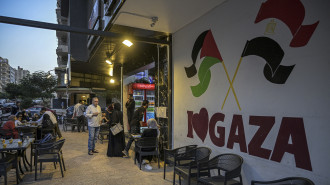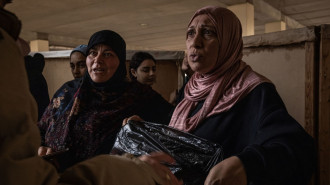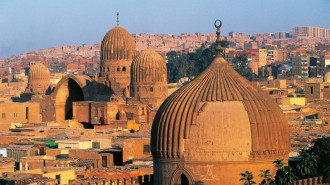Lebanon's tradition of celebratory gunshots comes under fire
Whether it's joy, political passion or grief, for many Lebanese, there's only one way to show it: by lifting a gun and firing off rounds into the air.
But the deadly practice, a tradition in many Arab countries, has attracted new scrutiny and police attention following a spate of deaths and serious injuries in incidents involving indiscriminate gunfire.
"It felt like a fire had burst into my chest," said 15-year-old Hussein Azab, whose chest was pierced by a bullet fired during celebrations after municipal elections in May.
One person was killed and three others were wounded in celebratory gunfire that day.
The following month, a child was killed and a woman wounded in separate incidents by people firing guns to celebrate official exam results.
"I was with my mum, my brother and my aunt on our way to my grandfather's house at around 8:30 [pm] when I was hit," said Azab, who was shot in southern Beirut.
"The blood started pouring out of my chest and I was very afraid. I thought I would die," he said, struggling to recount his ordeal as he gazed at the 15-centimetre [six-inch] scar running down his chest.
 |
The blood started pouring out of my chest and I was very afraid. I thought I would die - Hussein Azab, 15 years old |
 |
The experience has also scarred him psychologically, leaving him afraid of loud noises, particularly fireworks.
"My life changed. I've become irritable and afraid all the time. I can't sleep, and if I do, I wake up from panic attacks," he said.
Azab's mother Wafaa was angry and tearful. "They were celebrating winning elections while we were crying blood."
'A sick phenomenon'
With the deadly incidents making headlines, Lebanon's police force says it has made more than 130 arrests of people firing in the air since early June.
It is also encouraging people to report shooters via a special hotline.
Police spokesman Joseph Mousallem called the practice "a sick, fatal phenomenon."
"Civilians must come together to stop shooting and not be silent about the shooters," he told AFP, "This isn't an issue of tradition. It is a crime that leads to death."
 |
This isn't an issue of tradition. It is a crime that leads to death. - Joseph Mousallem, Police spokesman |
 |
Officially, celebratory gunfire is illegal in Lebanon, where firearm ownership remains widespread more than two decades after the end of its 1975-1990 civil war.
A 1959 law states "anyone firing in residential areas or in a crowd, whether their gun is licensed or not" faces up to three years in prison or a fine.
But the fine has not increased since it was set at 500 Lebanese pounds in 1959, an amount now worth just 60 US cents.
Shopowner Qassem, a resident of the southern Lebanese port city of Sidon, is undeterred by the legislation.
He first fired into the air 14 years ago, to celebrate the birth of his daughter.
 |
It was our first joy and I shot about 75 bullets into the air - Shopowner Qassem, on the birth of his daughter |
 |
"It was our first joy and I shot about 75 bullets into the air. I started firing every year on my daughter's birthday, which is Lebanese Independence Day," he said.
He insisted he takes precautions before firing, refraining from shooting in packed residential streets and asking those around him to step away before he lets loose.
'Sky hasn't swallowed a bullet'
In a bid to deter people like Qassem, one member of parliament has submitted a draft law increasing the jail time for such gunfire to up to 20 years, and the maximum fine to the equivalent of $12,500.
The bill has received support from various political parties, but it has yet to be voted on because Lebanon's parliament is paralysed and not meeting to legislate.
In the interim, the powerful Shia militant group Hizballah has taken the initiative to curb indiscriminate shooting in neighbourhoods under its control.
 |
I know that firing weapons is an expression of joy or sadness, but the sky has never once swallowed a bullet - Fadi Abi Allam, the Permanent Peace Movement |
 |
The issue is more pressing for the group because its supporters often fire bursts of bullets into the air when Hizballah chief Hassan Nasrallah gives one of his frequent speeches, or during the funerals of fighters killed in the Syrian conflict.
Nasrallah himself has publicly criticised the practice, telling his supporters in June that celebratory gunfire "will be enough for us to expel someone from our ranks".
The decision would apply to everyone, even senior Hizballah members "who have been fighting Israel for 30 years", he warned.
Fadi Abi Allam, who heads the Permanent Peace Movement, an NGO, called for tighter regulations and better implementation of existing gun laws.
"I know that firing weapons is an expression of joy or sadness, but the sky has never once swallowed a bullet," he said.
Exacerbating the issue is the sheer number of weapons in Lebanon.
An estimated four million guns are licenced as personal firearms in Lebanon, which has just four million citizens, according to Abi Allam.
"Some households don't own any weapons -- others own dozens," he said.
Abi Allam urged families, schools, religious figures, civil society and the state to combine their efforts and work together to put an end to the practice.

![Palestinians mourned the victims of an Israeli strike on Deir al-Balah [Getty]](/sites/default/files/styles/image_684x385/public/2024-11/GettyImages-2182362043.jpg?h=199d8c1f&itok=xSHZFbmc)


![The law could be enforced against teachers without prior notice [Getty]](/sites/default/files/styles/image_684x385/public/2178740715.jpeg?h=a5f2f23a&itok=hnqrCS4x)
 Follow the Middle East's top stories in English at The New Arab on Google News
Follow the Middle East's top stories in English at The New Arab on Google News


